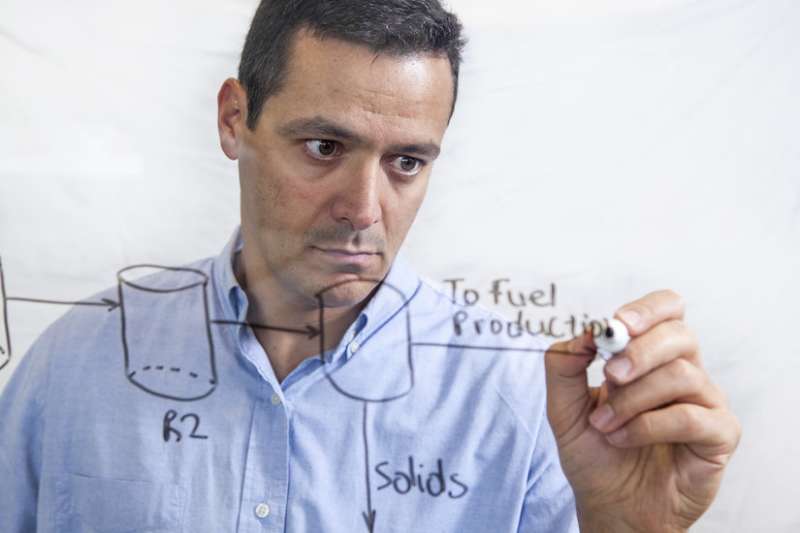New research looks beyond carbon efficiency to improve advanced biofuel strategy development

Conventional wisdom in biofuels research holds that carbon efficiency is the most important factor for determining promising strategies for the production of biofuels. For researchers, this means that the more carbon in the crop that ends up as carbon in the fuel, the better.
But carbon efficiency may not be the whole story: fuel quality and energy requirements are also key factors for selecting next-generation biofuels strategies, according to a study out today [Sept. 28, 2018] from researchers at the University of Wisconsin–Madison and the Great Lakes Bioenergy Research Center (GLBRC).
In a new paper in the journal Joule, GLBRC researchers Christos Maravelias and Peyman Fasahati aimed to identify critical drivers, outside of carbon efficiency, for assessing new biofuels strategies and found that there are two other vital parameters: the energy required to produce the fuels in a biorefinery and the fuels' efficiency in a vehicle's engine.
To perform their analyses, Maravelias, Vilas Distinguished Achievement and Paul A. Elfers Professor of chemical and biological engineering; and Fasahati, a postdoctoral researcher working with Maravelias, compared two processes for producing biofuels from corn stover: biological conversion to ethanol (BCE) and catalytic conversion to alkenes (CCA). Alkenes are long carbon chains containing at least one double-bond; those produced by the CCA process are used to make diesel.
Their results show that all three parameters – carbon efficiency, process energy requirements, and fuel efficiency – are important, and that the most carbon efficient strategy may not automatically be the most effective strategy overall.
"For example, BCE, which produces ethanol, has very high carbon efficiency, but the fuel itself has lower energy content," says Fasahati. "With CCA, less of the original carbon ends up in the fuel produced, but the fuel has a higher efficiency when you burn it in a car."
Fasahati and Maravelias also factored electricity generation into their calculation of production energy efficiency for each strategy. Electricity is a byproduct of converting biomass to fuel in a biorefinery: the waste (mostly lignin and conversion residue) is burned, resulting in heat which powers the conversion process and creates electricity which can be sold to the grid.
Fasahati and Maravelias recognized that when electricity generation was incorporated into their analyses, both strategies had the potential to produce more total mechanical energy for transportation, because the electricity produced could be used to power electric cars while the fuel itself could power traditional internal-combustion vehicles.
However, processes that require less energy for conversion also produce more electricity for distribution. Because of this, the CCA process, which already produces a fuel that burns more efficiently (diesel), also produces almost 60 percent more mechanical energy in the form of electricity than the BCE process.
Thus the CCA strategy, despite being less carbon efficient, achieves better results overall because it produces more mechanical energy from both electricity and fuel.
The paper suggests that research on optimizing strategies to produce alternative biofuels and bioproducts remains important, even if it does not achieve the high carbon efficiency of strategies like BCE that produce ethanol.
"The general understanding is that if you have more carbon, you can run longer," Fasahati says. "But we showed that there's more to the story."
The authors hope that their paper will help others in the field rethink the carbon efficiency model to take a more holistic approach as they work to develop the next-generation biofuels that will help meet the Department of Energy's Renewable Fuel Standard in the future.
Maravelias said, "Going forward, we are excited about the possibilities for new biofuel production strategies that look beyond carbon efficiency, taking into account the parameters discussed in this work."
More information: Peyman Fasahati et al. Advanced Biofuels of the Future: Atom-Economical or Energy-Economical?, Joule (2018). DOI: 10.1016/j.joule.2018.09.007


















